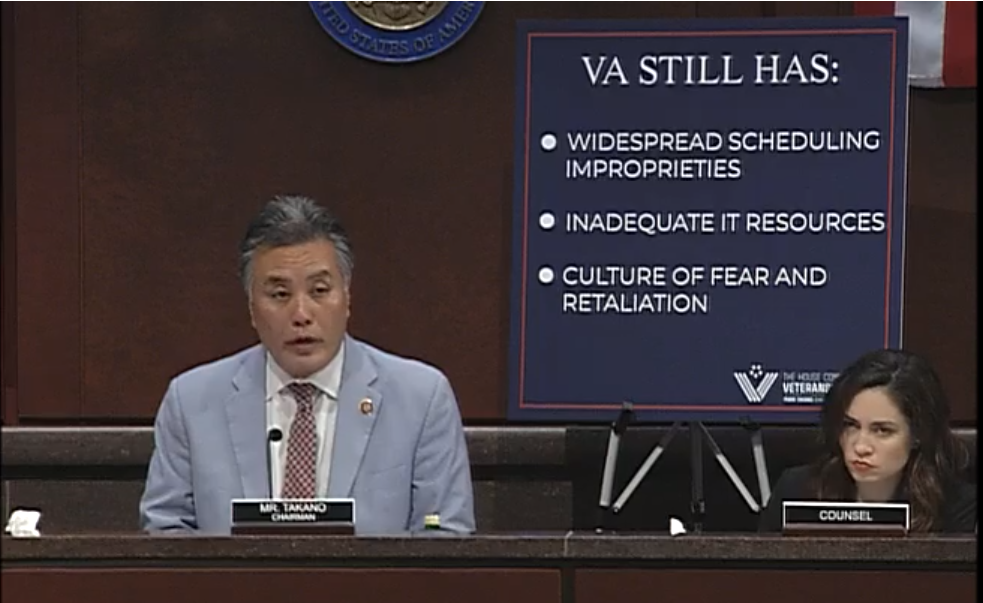Chairman Takano: “We simply cannot put veterans’ lives at risk while they wait for care”
Press Contact
Jenni Geurink (202-225-9756)
Miguel R. Salazar
WASHINGTON, D.C. – Today, House Committee on Veterans’ Affairs Chairman Mark Takano (CA-41) delivered opening remarks before the full committee oversight hearing entitled “True Transparency? Assessing Wait Times Five Years after Phoenix” to address VA’s “secret wait lists” on the fifth anniversary of an HVAC hearing on the Phoenix VA wait time scandal.
Below is a link to the video of the Chairman’s opening statement and his remarks as prepared:
Good morning. I call this hearing to order.
This year marks the 5-year anniversary of a watershed moment for VA and for this Committee: the 2014 VA wait-time scandal. Whistleblowers from the Phoenix VA Health Care System exposed an elaborate scheme by supervisors and senior leaders to conceal the amount of time veterans were waiting to receive health care.
Some patients’ conditions deteriorated, while other veterans died after waiting too long for VA appointments.
After months of hearings and independent investigations, we concluded that serious appointment scheduling improprieties and delays in veterans’ access to care were not limited to Phoenix but were occurring at dozens of other VA facilities nationwide…and this had been going on for years. To address this, Congress passed the Veterans Choice Program in August 2014, with the goal of helping veterans access more timely health care by sending them to community providers.
5 years ago today, we held a hearing with VA’s then-Acting Secretary, Sloan Gibson, and leaders from several veterans service organizations to learn how VA planned to restore the trust of veterans, Congress, and the American people. In his statement for that hearing, Mr. Gibson presented a stark but honest assessment of VA’s challenges. Three of the main challenges he identified are on this chart:
- Widespread scheduling improprieties
- Inadequate IT resources, and
- A culture of fear and retaliation
Honestly, after reviewing our witnesses’ written testimony and several articles that have appeared recently in the national media, I am alarmed that too much of what Acting Secretary Gibson observed 5 years ago still rings true today. This is unacceptable—we simply cannot put veterans’ lives at risk while they wait for care.
Today, it is time to assess VA’s progress in earning back the trust of veterans, Congress, and the American people.
Within the last couple of months, several media outlets published articles where whistleblowers allege that VA is still keeping secret waiting lists. This doesn’t come as a surprise.
Our committee staff also have been approached by several whistleblowers with these allegations, and some have faced retaliation after raising their concerns with VA. They allege that VA has mass-cancelled pending requests for certain types of care without sufficient clinical review, and that front-line employees have been ordered to schedule veteran patients in “imaginary clinics” as a means of concealing wait times.
Some of these whistleblowers recently testified before our Committee. Yet, as we learned from the whistleblower hearing that wrapped up yesterday, VA’s Office of Accountability and Whistleblower Protection is failing to protect whistleblowers.
We rely on whistleblowers to speak truth to power and hold VA accountable. OAWP must do its job and immediately end the toxic culture of retaliation at VA.
Dr. Boyd, you claim in your written statement that “no veterans were harmed,” as a result of being on wait lists like those mentioned in the news. You also state that VA is operating with “unprecedented transparency.”
Those are two very bold statements.
With the MISSION Act, more and more veterans will be eligible for community care. However, as you will hear from some of our witnesses today, VA has never reliably tracked or reported veterans’ wait times for community care. Yet, there is evidence that wait times in the community are often longer than wait times for VA care. VA’s own data on wait times for appointments at VA facilities remain incomplete and unreliable.
The policy goal of the Choice Act and the MISSION Act was to reduce wait times for veterans and increase access.
Therefore, the lack of accurate information on wait times at VA hospitals and with community providers should cause us all to question whether the policy to send more veterans to community care providers is sound, or if it is even working.
Veterans have a right to make informed choices about where to receive care. However, that choice is dependent on transparent and accurate information about wait times. This Committee will not allow our veterans to be harmed by the same deceptive practices that led to the Phoenix VA scandal.
I look forward to engaging our witnesses and my colleagues in this conversation, and with that, I will recognize Ranking Member Roe for 5 minutes for any opening remarks he may have.
###
Next Article Previous Article

